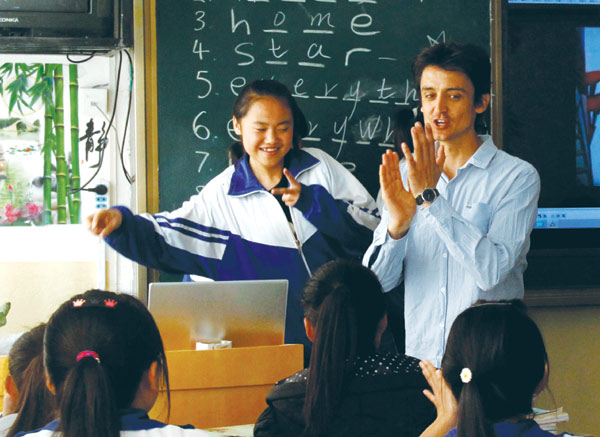 |
|
Michael Forde, a teacher from New Zealand, instructs students at a class at Bailie Vocational School in Shandan, Gansu province. ZHAI JIZONG / FOR CHINA DAILY |
Unique vocational studies combine classroom and practical instruction
As the only foreigner working in Shandan, a remote county in Gansu province between the Gobi Desert and the Tibetan-Qinghai Plateau, Michael Forde occasionally feels isolated from his New Zealand home.
But Forde, who volunteered to teach English at Bailie Vocational School for a year, needs only to think about the school's colorful history to realize his roots are all around him. He is the 28th volunteer from New Zealand who has taught at the school since 1987.
Rewi Alley, a New Zealand-born educator and social reformer, founded the school in February 1945, just before the end of World War II, with George Hogg, a freelance reporter and British adventurer who was sympathetic to the Chinese people's suffering during the War of Resistance Against Japanese Aggression (1937-45).
Forde, who has a friend at the New Zealand China Friendship Society, which supplies a teacher each year to the school in Shandan, was captivated by what he heard about the school, which has 2,120 students, 148 teachers, and 15 majors in industry and agriculture.
"He told me the interesting stories about Rewi Alley and the school," Forde said. "So I decided to see the school."
Colorful history
Named after the Canadian missionary Joseph Bailie, who actively promoted agricultural education in China in the early 20th century, the school has an intriguing focus on vocational instruction that emphasizes using "hands and mind together".
At its founding, Alley acted as the school's headmaster, instructor, academic dean, dorm supervisor and liaison officer for overseas support.
He required the students to use their hands and brains equally, and emphasized analysis and innovation. He believed China needed many technicians and engineers to fuel industrial growth.
With assistance from New Zealand and international organizations, Alley's school offered free education and boarding to poor local students and trained them to be carpenters, architects, agricultural technicians, mechanists, miners, civil engineers and doctors.
"Alley's students transformed Shandan's productivity level from medieval to industrial age in a few years in the late 1940s," said Zha Jiguang, 58, the school's headmaster. "Alley's students also became backbone technicians for the oil fields that developed in the 1950s and 1960s in Gansu, Heilongjiang, Shandong and Liaoning provinces."
Alley died in Beijing in December 1987 at age 90 and the Chinese government reopened the Shandan Bailie Vocational School that year at his request. Since then, the school has produced more than 10,000 technicians. It became a national key school in 2007.
Xi Zhongxun, a revolutionary leader in Northeast China in the 1930s and 1940s, a former State leader of China and father of President Xi Jinping, was among the school's honorary headmasters.